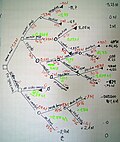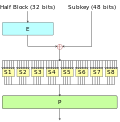In computational complexity theory, the complexity class FP is the set of function problems that can be solved by a deterministic Turing machine in polynomial...
3 KB (354 words) - 07:12, 17 October 2024
universe of late Scottish author Iain Banks FP (complexity), in computational complexity theory, a complexity class FP (programming language) designed by John...
4 KB (546 words) - 16:10, 11 March 2025
Other types of problems that certain complexity classes are defined in terms of include: Function problems (e.g. FP) Counting problems (e.g. #P) Optimization...
75 KB (10,382 words) - 17:19, 13 June 2025
Computability and Complexity: Theory and Applications, Prentice Hall, 2008, ISBN 0-13-228806-0, section 28.10 "The problem classes FP and FNP", pp. 689–694...
4 KB (596 words) - 22:03, 17 March 2025
problems is FP. Many important complexity classes can be defined by bounding the time or space used by the algorithm. Some important complexity classes of...
50 KB (6,704 words) - 04:30, 7 July 2025
In computational complexity theory, the complexity class FL is the set of function problems which can be solved by a deterministic Turing machine in a...
2 KB (273 words) - 08:17, 17 October 2024
TFNP (category Complexity classes)
{NP}}\cap {\mathsf {coNP}})={\mathsf {\color {Blue}FP}}} . NP is one of the most widely studied complexity classes. The conjecture that there are intractable...
17 KB (2,698 words) - 03:24, 30 April 2024
In computational complexity theory, P, also known as PTIME or DTIME(nO(1)), is a fundamental complexity class. It contains all decision problems that can...
15 KB (1,940 words) - 10:17, 2 June 2025
functional classes FP and #P. By a generalization of Ladner's theorem, there are also problems in neither FP nor #P-complete as long as FP ≠ #P. As in the...
29 KB (3,364 words) - 22:02, 19 June 2025
Forças Populares 25 de Abril (redirect from FP-25)
Forças Populares 25 de Abril (English: Popular Forces 25 April; FP 25 de Abril or FP-25) was a far-left terrorist group operating in Portugal between...
24 KB (2,740 words) - 14:12, 24 June 2025
the computational complexity of various algorithms for common mathematical operations. Here, complexity refers to the time complexity of performing computations...
27 KB (1,617 words) - 19:08, 30 July 2025
of complexity classes in computational complexity theory. For other computational and complexity subjects, see list of computability and complexity topics...
8 KB (176 words) - 07:24, 19 June 2024
computability and complexity: theory and applications, Prentice Hall, 2008, ISBN 0-13-228806-0, section 28.10 "The problem classes FP and FNP", pp. 689–694...
8 KB (1,174 words) - 14:55, 13 May 2025
Floating-point unit (redirect from FP emulation)
Retrieved 14 March 2022. Halfacree, Gareth (28 October 2010). "AMD unveils Flex FP". bit-tech.net. Archived from the original on Mar 22, 2017. Retrieved 29 March...
18 KB (1,948 words) - 15:17, 2 April 2025
♯P (category Complexity classes)
In computational complexity theory, the complexity class #P (pronounced "sharp P" or, sometimes "number P" or "hash P") is the set of the counting problems...
7 KB (944 words) - 15:48, 17 January 2025
intended to overcome the drawbacks of the LOC, FP and token (operation and operand) counts. However, an FP score can also be used to supplement an ABC score...
11 KB (1,353 words) - 02:50, 12 March 2025
♯P-complete (category Complexity classes)
complete", or "hash P complete") form a complexity class in computational complexity theory. The problems in this complexity class are defined by having the following...
7 KB (852 words) - 01:23, 23 July 2025
Rolling hash (redirect from Computational complexity of rolling hash functions)
while i < MinSize do fp ← (fp << 1 ) + Gear[src[i]] i ← i + 1 while i < n do fp ← (fp << 1 ) + Gear[src[i]] if !(fp & Mask) then return i i ←...
14 KB (2,015 words) - 12:56, 4 July 2025
sense. The important complexity classes of polynomial-time decidable sets (the class P) and polynomial-time computable functions (FP) have received much...
9 KB (1,348 words) - 13:50, 19 December 2024
Boolean satisfiability problem (section Complexity)
used in several theorems in complexity theory: NP ⊆ P/poly ⇒ PH = Σ2 (Karp–Lipton theorem) NP ⊆ BPP ⇒ NP = RP P = NP ⇒ FP = FNP Since the SAT problem...
45 KB (4,824 words) - 00:33, 23 July 2025
TC0 (category Circuit complexity)
theoretical computer science, and specifically computational complexity theory and circuit complexity, TC0 (Threshold Circuit) is the first class in the hierarchy...
31 KB (4,920 words) - 00:43, 20 June 2025
computing f on it). Thus, the existence of a one-way function implies that FP ≠ FNP, which in turn implies that P ≠ NP. However, P ≠ NP does not imply the...
14 KB (1,957 words) - 10:31, 21 July 2025
Total functional programming (redirect from Total FP)
recurs to a maximum depth of the length of the vector (worst-case time complexity O(n2)). A quicksort implementation on lists (which would be rejected by...
6 KB (719 words) - 14:49, 20 May 2025
Association rule learning (redirect from FP-growth)
the tid-lists become too large for memory. FP-growth outperforms the Apriori and Eclat. This is due to the FP-growth algorithm not having candidate generation...
49 KB (6,709 words) - 17:50, 13 July 2025
discovery rate (FDR): FDR = F P / ( F P + T P ) {\displaystyle {\text{FDR}}=FP/(FP+TP)} = 1 / ( 1 + 11 ) = 8.30 % {\displaystyle =1/(1+11)=8.30\%} False omission...
26 KB (3,464 words) - 04:00, 6 June 2025
acquitted. The judge in charge claimed that it was certain that the terrorist FP-25 group had committed the attacks, but not enough admissible proofs indicated...
52 KB (5,658 words) - 15:27, 18 June 2025
past light cone); and R∗ = the average rate of star formation in our galaxy. fp = the fraction of those stars that have planets. ne = the average number of...
75 KB (8,655 words) - 08:45, 27 July 2025
In computational complexity theory, Polynomial Local Search (PLS) is a complexity class that models the difficulty of finding a locally optimal solution...
35 KB (5,471 words) - 04:13, 30 March 2025
and final permutation, termed IP and FP, which are inverses (IP "undoes" the action of FP, and vice versa). IP and FP have no cryptographic significance...
60 KB (6,717 words) - 14:31, 5 July 2025
In computational complexity theory, the complexity class PPP (polynomial pigeonhole principle) is a subclass of TFNP. It is the class of search problems...
7 KB (1,000 words) - 11:26, 29 March 2024








